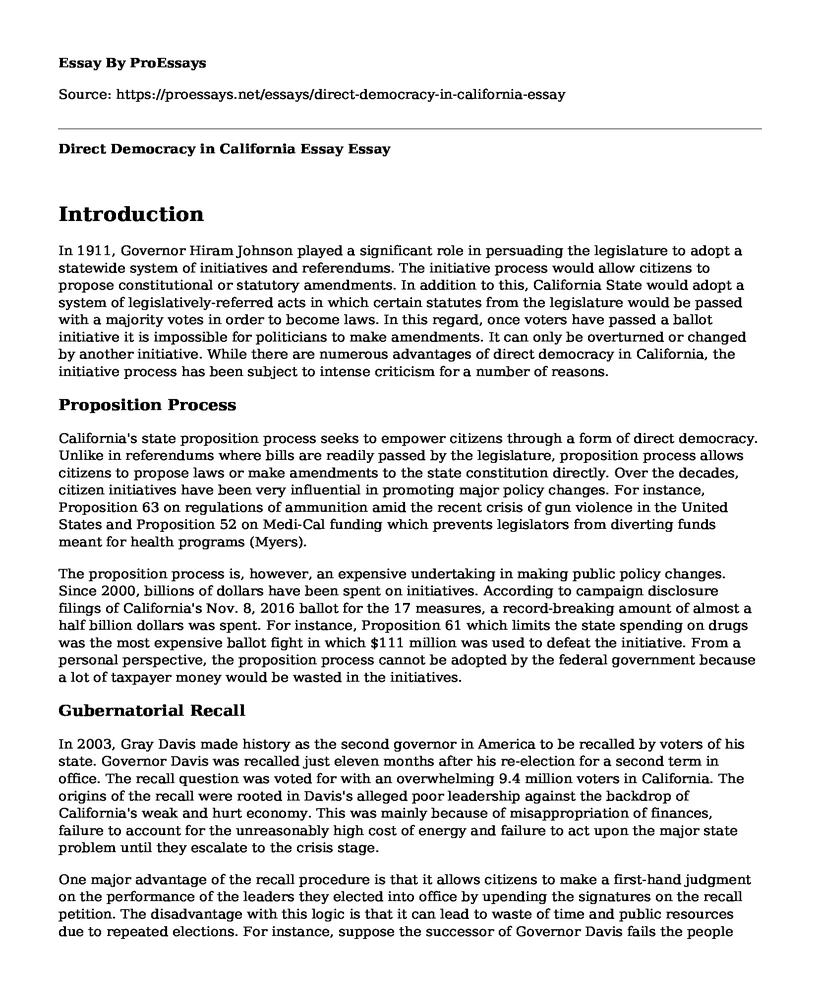Introduction
In 1911, Governor Hiram Johnson played a significant role in persuading the legislature to adopt a statewide system of initiatives and referendums. The initiative process would allow citizens to propose constitutional or statutory amendments. In addition to this, California State would adopt a system of legislatively-referred acts in which certain statutes from the legislature would be passed with a majority votes in order to become laws. In this regard, once voters have passed a ballot initiative it is impossible for politicians to make amendments. It can only be overturned or changed by another initiative. While there are numerous advantages of direct democracy in California, the initiative process has been subject to intense criticism for a number of reasons.
Proposition Process
California's state proposition process seeks to empower citizens through a form of direct democracy. Unlike in referendums where bills are readily passed by the legislature, proposition process allows citizens to propose laws or make amendments to the state constitution directly. Over the decades, citizen initiatives have been very influential in promoting major policy changes. For instance, Proposition 63 on regulations of ammunition amid the recent crisis of gun violence in the United States and Proposition 52 on Medi-Cal funding which prevents legislators from diverting funds meant for health programs (Myers).
The proposition process is, however, an expensive undertaking in making public policy changes. Since 2000, billions of dollars have been spent on initiatives. According to campaign disclosure filings of California's Nov. 8, 2016 ballot for the 17 measures, a record-breaking amount of almost a half billion dollars was spent. For instance, Proposition 61 which limits the state spending on drugs was the most expensive ballot fight in which $111 million was used to defeat the initiative. From a personal perspective, the proposition process cannot be adopted by the federal government because a lot of taxpayer money would be wasted in the initiatives.
Gubernatorial Recall
In 2003, Gray Davis made history as the second governor in America to be recalled by voters of his state. Governor Davis was recalled just eleven months after his re-election for a second term in office. The recall question was voted for with an overwhelming 9.4 million voters in California. The origins of the recall were rooted in Davis's alleged poor leadership against the backdrop of California's weak and hurt economy. This was mainly because of misappropriation of finances, failure to account for the unreasonably high cost of energy and failure to act upon the major state problem until they escalate to the crisis stage.
One major advantage of the recall procedure is that it allows citizens to make a first-hand judgment on the performance of the leaders they elected into office by upending the signatures on the recall petition. The disadvantage with this logic is that it can lead to waste of time and public resources due to repeated elections. For instance, suppose the successor of Governor Davis fails the people will again be subjected to the same process again and again until they find a perfect candidate which is impossible. There is also a possibility of wrong judgment driven by political assassination by rival leaders. In my opinion, leaders should be held accountable for their failure no matter the cost. I would suggest the recall procedure to be adopted by the federal government because it allows citizens to exercise their sovereignty by enforcing accountability over their representatives.
Works Cited
Myers, John. "What you need to know about the 17 propositions on November's statewide ballot." LA Times (2016): 4-7.
Cite this page
Direct Democracy in California Essay. (2022, May 26). Retrieved from https://proessays.net/essays/direct-democracy-in-california-essay
If you are the original author of this essay and no longer wish to have it published on the ProEssays website, please click below to request its removal:
- Why States Adopt Human Rights Treaties and Join Human Rights Organizations
- A Review of Maritime Security Accidents and Related Initiatives from the Industry and Regulators
- Paper Example on Sex Offender Registration Laws
- News Frames and Priming of War on Drugs Essay Example
- Essay Example on Obama Care in Texas: Potential Issues and Challenges
- Essay Example on China's Economic Growth: Thirty Years of Transformation
- Paper Example on Trade, Politics, and the Great Game: The Eastern Question Explored







